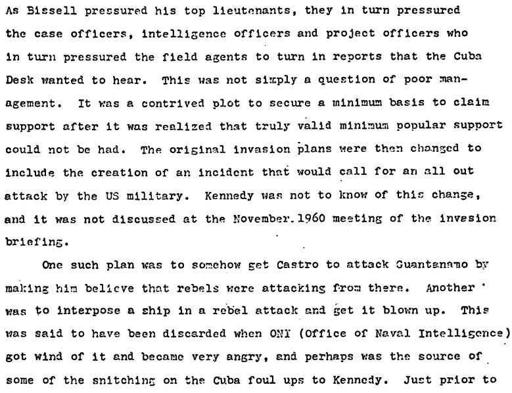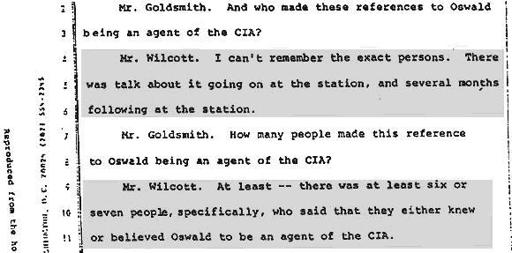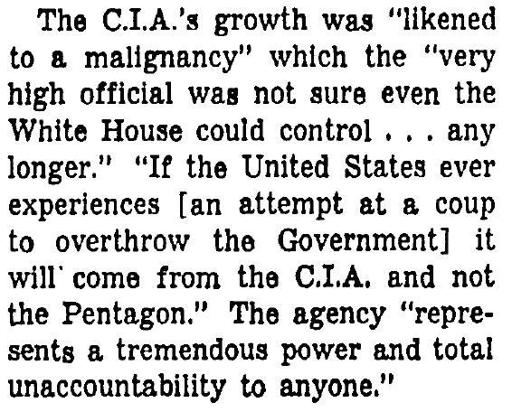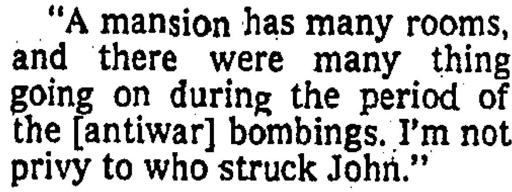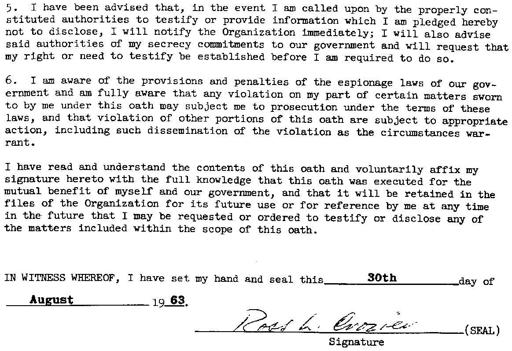Impossible: The Case Against Lee Harvey Oswald (28 page)
Read Impossible: The Case Against Lee Harvey Oswald Online
Authors: Barry Krusch
Tags: #Non-Fiction, #History

BOOK: Impossible: The Case Against Lee Harvey Oswald
5.27Mb size Format: txt, pdf, ePub
Wilcott provided an interview in March 22, 1978 for the HSCA. In that interview, Wilcott not only linked Oswald to the CIA, but also the CIA to the assassination, provocatively suggesting as a possibility Warren Commissioner Dulles’ involvement in the murder (Wilcott interview, p. 12; JFK Record Number 180-10116-10096):
9
Coming from a CIA insider, this is information that can’t be ignored. Furthermore, we know Wilcott was privy to insider information.
Take a look at the second paragraph in the screen capture below, where Wilcott predicts an operation similar to Operation Northwoods. This is extremely significant, because the Wilcott statement was prepared in 1978, over 20 years before anyone knew the Northwoods memo existed! (Wilcott interview, p. 15)
10
Willcott also said that several CIA personnel — “at least six or seven” — knew that Oswald had been a CIA agent
(
Wilcott interview Executive Session, p. 8; this screen capture is from the original transcript):
11
Wilcott was not the only CIA insider to connect the CIA to the assassination. Several members of the CIA participated in a conspiracy to murder Kennedy, according to a deathbed confession by E. Howard Hunt which was given most likely in January 2007, a confession which has
still
not been reported in the major media as of April 10, 2012 (based on a
Nexis
search by the author [only one story found in the
Eureka Times Standard
]), in an operation which Hunt referred to as “the big event,” which reads in pertinent part as follows (names of CIA personnel in bold italic):
12
I heard from
Frank
[BK: Sturgis] that LBJ had designated
Cord Meyer Jr.
to undertake a larger organization while keeping it totally secret. Cord Meyer himself was a rather favorite member of the Eastern aristocracy. . . .
As for
Dave Philips
, I knew him pretty well at one time. He worked for me during the Guatemala project. He made himself useful to the agency in Santiago, Chile where he was an American businessman. In any case, his actions, whatever they were, came to the attention of the Santiago station chief and when his resume became known to people in the Western Hemisphere division he was brought in to work on Guatemalan operations.
Sturgis
and
Morales
and people of that ilk, stayed in apartment houses during preparations for the big event. Their addresses were very subject to change so that where a fellow like Morales had been one day, you’d not necessarily associated with that address the following day. In short it was a very mobile experience. . . .
What is important in the story is that we backtrack the chain of command up through Cord Meyer and laying the doings at the doorstep of LBJ. He in my opinion, had an almost maniacal urge to become President. He regarded JFK, as he was in fact, an obstacle to achieving that. He could have waited for JFK to finish out his term and then undoubtedly a second term. So that would have put LBJ at the head of a long list of people who were waiting for some change in the executive branch.
Of course, this maps on perfectly to the prediction in the
Times
we saw earlier that any coup d’état in the United States would be CIA-driven:
13
This article is especially significant, because it was written by a reporter so close to Kennedy that he helped Kennedy edit
Profiles In Coverage
, and therefore had excellent access to Kennedy, which could have meant that this story originated from Kennedy himself (for even more background on this relationship, see the post-1992 edition of Mark Lane’s
Rush To Judgment
, p. viii-x).
Another provocative statement linking the CIA to the assassination was uttered by another CIA insider, James Angleton (chief of the CIA’s counterintelligence (CI) staff from 1954 to 1975), who made a curious statement in some parting remarks (after resigning) to
The New York Times
on December 25th, 1974:
14
Another CIA insider who linked Oswald to the CIA was former executive assistant to the Deputy Director, Victor Marchetti. In the book
JFK And The Unspeakable
, James Douglass described Marchetti’s theory about a phone call placed by Oswald from prison to a “John Hurt” in Raleigh, North Carolina. There were two John Hurts in Raleigh. One of them had a military intelligence background: John David Hurt served as U.S. Army counterintelligence Special Agent. Marchetti explained why (
JFK And The Unspeakable,
p. 365):
Marchetti said he thought Oswald was following the standard intelligence practice of trying to contact his case officer through a “cut-out,” a “clean” intermediary with no direct involvement in an operation. As to why Oswald’s call was made to North Carolina, Marchetti pointed out that the Office of Naval Intelligence had an operations center in Nags Head, North Carolina, for agents who had been sent as fake expatriates to the Soviet Union — corresponding to Oswald’s background.
In an interview, Marchetti said, “[Oswald] was probably calling his cutout. He was calling somebody who could put him in touch with his case officer. He couldn’t go beyond that person. There’s no way he could. He just had to depend on this person to say, ‘Okay, I’ll deliver the message.’ Now, if the cut-out has already been alerted to cut him off and ignore him, then . . .”
However, contacting this “cutout,” if that is indeed what happened, would have been an extremely risky business, if he was the wrong person to contact.
One indication is a
Termination Secrecy Oath
CIA personnel were required to sign in the early ‘60’s. Here is one example from August, 1963, an oath signed by Ross Crozier. Notice what it says: "in the event I am called upon . . . to testify or provide information which I am pledged hereby not disclose,
I will notify the Organization immediately
.” Note that violation would have exposed the person signing the oath to prosecution under espionage laws:
14a
Any CIA personnel threatening to expose the relationship to the wrong individual could have been killed for doing that, and Marchetti had no problem admitting that he himself would do the killing! (
JFK And The Unspeakable
, p. 366)
Other books
A Darkening Stain by Robert Wilson
Skybreaker by Kenneth Oppel
Merging Assets by Cheryl Dragon
Grime by K.H. Leigh
Jill by Philip Larkin
Nu Trilogy 1: The Esss Advance by Charles E. Waugh
The White Dragon by Salvador Mercer
The Lisa Series by Charles Arnold
HUNTER (The Caine Brothers Book 1) by Madigan, Margaret
Quest for Honour by Sam Barone

